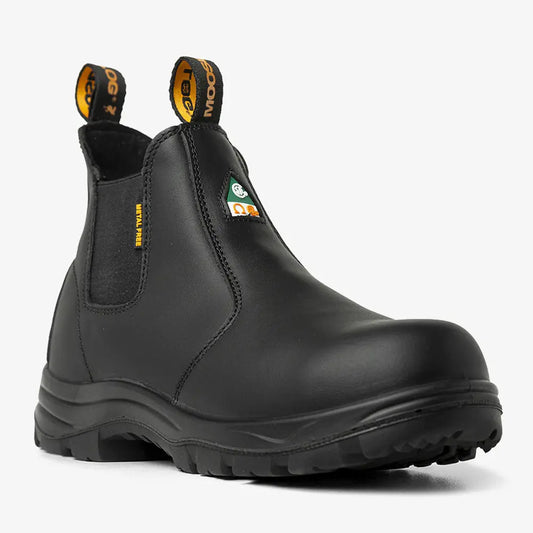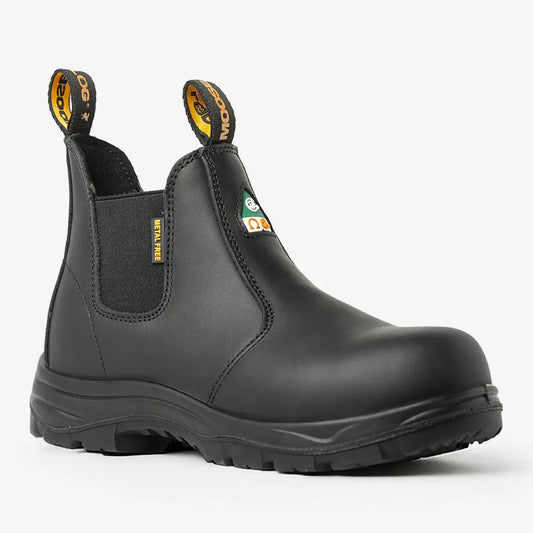
Why ASTM Certified Work Boots Are Essential for Heavy Equipment Operators
Operating heavy equipment is a high-risk profession. Whether maneuvering forklifts, excavators, loaders, or cranes, heavy equipment operators are surrounded by potential dangers every shift. That’s why protective gear—especially footwear—must go beyond basic coverage. ASTM certified work boots are essential for minimizing injury risks and maintaining performance under physically demanding conditions.
In this post, we’ll explore how ASTM-certified boots protect heavy equipment operators and improve job performance while meeting critical safety standards.
Understanding ASTM Certification for Footwear
ASTM International develops global safety standards, including those for protective footwear. The most relevant for job site boots is ASTM F2413, which outlines how work boots must perform when exposed to specific job site hazards.
ASTM-certified boots undergo stringent testing for impact resistance, compression resistance, puncture resistance, electrical hazard protection, and more. These standards ensure your boots can handle real-world risks, not just look tough.
To learn more about the testing process and certification breakdown, visit the ASTM official website.
What Makes Heavy Equipment Operation Risky?
Heavy equipment operators face several daily hazards that put their feet at risk:
- Falling objects like metal parts or tools
- Accidental rollovers or foot run-overs by machinery
- Exposure to nails, screws, or sharp objects on the ground
- Slippery, uneven terrain inside and around work zones
- Electrical components or wiring near machinery
In environments like construction zones, shipping yards, and industrial plants, these hazards are not just possibilities—they’re routine. That’s why choosing ASTM-certified footwear is a must.
Key ASTM Safety Features for Heavy Equipment Operators
Here’s how ASTM-certified work boots specifically benefit heavy equipment operators:
1. Impact and Compression Resistance
Boots must withstand the impact of dropped tools, machine parts, or rolling machinery. ASTM’s I/75 and C/75 ratings ensure that the toe box protects your feet from crushing and compression injuries. Operators often work in tight quarters or near moving parts, where a single misstep can result in disaster.
2. Puncture-Resistant Soles
Debris like sharp metal scraps, screws, and nails are common near heavy machinery. ASTM-certified boots labeled with “PR” include puncture-resistant midsoles, helping operators avoid foot injuries from stepping on hidden dangers.
3. Slip-Resistant Outsoles
Operators constantly climb into and out of machines, often in wet or dusty conditions. ASTM-certified boots offer high-traction soles that help prevent slips and falls, both in and around machines and on unpredictable terrain.
4. Electrical Hazard Protection (EH)
ASTM boots rated “EH” help protect workers from open circuits or faulty equipment. While heavy equipment operators may not work directly with wiring, accidental contact with exposed components can still happen, especially in wet or damp conditions.
5. Ergonomic Support for Long Hours
Operating machinery requires long hours of standing, balancing, or using foot controls. ASTM-certified boots with ergonomic insoles, shock absorption, and arch support reduce fatigue and help operators stay focused and comfortable throughout the day.
Why MOOSELOG Boots Are Ideal for Equipment Operators
At MOOSELOG, we build work boots that deliver on all fronts: safety, comfort, durability, and compliance. Our ASTM-certified work boots are built with the real challenges of operating heavy machinery in mind.
Here’s what sets MOOSELOG boots apart:
- ASTM F2413 Certification: Verified protection against compression, impact, electrical hazards, and punctures
- Puncture-Resistant Midsoles: Kevlar and composite layers provide reliable foot defense against sharp objects
- Lightweight but Rugged Build: Reduces fatigue during long operating shifts
- Slip-Resistant Outsoles: Aggressive tread design improves traction on all surfaces
- Ergonomic Comfort: Cushioned footbeds and breathable linings keep you comfortable without compromising protection
When every step counts, trust MOOSELOG to deliver safety and performance.
How to Choose the Right ASTM-Certified Boot for Equipment Work
Here are some practical tips to find the right pair of boots for your job:
- Check the Label: Look for boots that include I/75, C/75, PR, and EH ratings to cover all bases.
- Assess the Environment: If you work in muddy, wet, or slick areas, prioritize aggressive outsole tread and waterproof materials.
- Go for Lightweight Durability: You don’t need to sacrifice comfort for safety—many boots offer both.
- Ensure Proper Fit: An ill-fitting boot can be dangerous and uncomfortable. Make sure your boots fit snugly but allow room for movement.
- Rotate Pairs if Possible: Having more than one pair extends boot life and helps manage foot fatigue.
Caring for Your ASTM Work Boots
Your boots work hard—give them the care they deserve:
- Clean After Use: Remove mud, oil, or metal shavings that can break down materials.
- Dry Properly: Always let boots air dry to prevent material breakdown and odor.
- Inspect Weekly: Watch for sole wear, puncture damage, or delamination.
- Replace When Worn: Don’t risk your safety—once the structure is compromised, it’s time for a new pair.
Final Thoughts: A Must-Have for Machine Operators
If you operate heavy equipment, your boots are more than just a part of your uniform—they’re essential tools of the trade. ASTM-certified work boots protect against the daily dangers of your profession and offer comfort features that allow you to work more efficiently and with confidence.
With MOOSELOG, you get boots that are not only certified but engineered for real-world use by real workers. We believe in combining performance with peace of mind—and that starts from the ground up.






